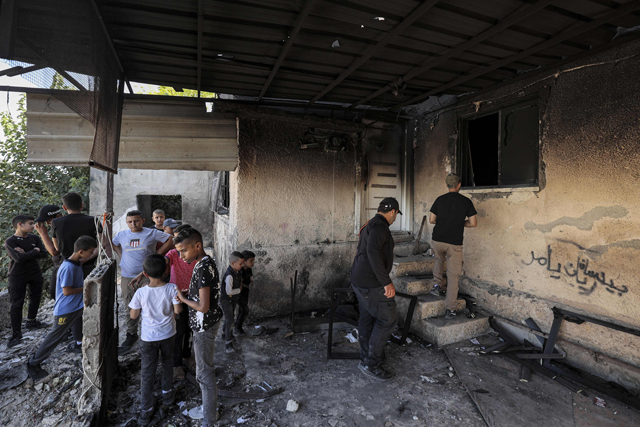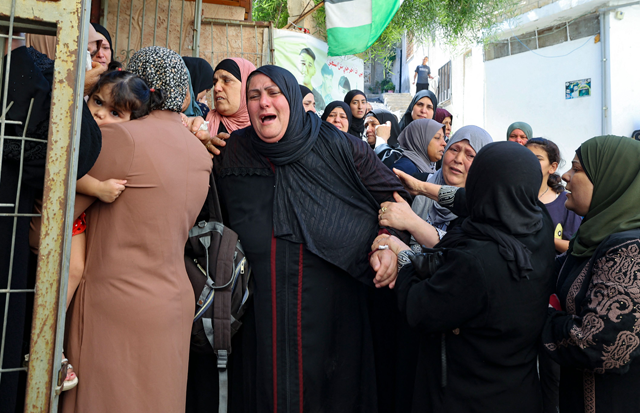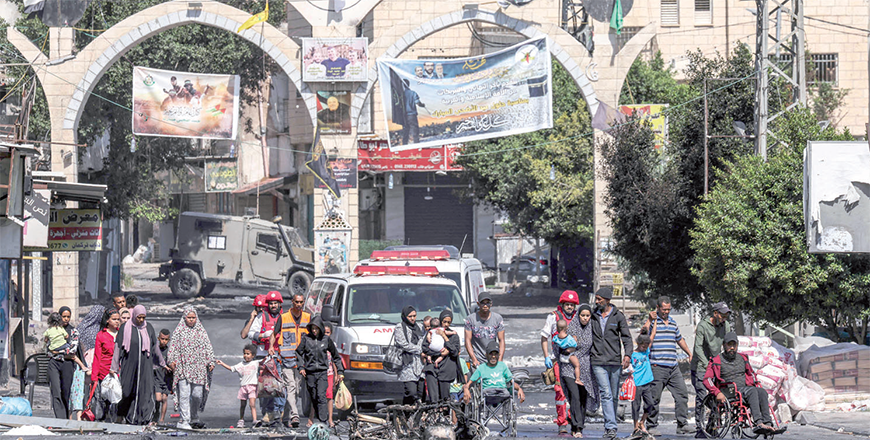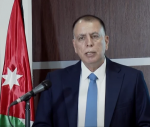You are here
With M16s and Telegram, West Palestinians vow to resist Israel
Apr 14,2022 - Last updated at Apr 14,2022
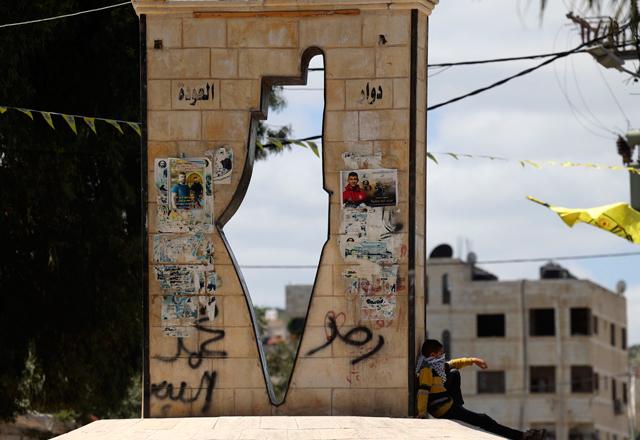
A Palestinian boy walks past a moument showing a map of Mandatory Palestine in the West Bank town of Jenin in the north of the occupied West Bank on Tuesday (AFP photo)
JENIN, Palestinian Territories — Armed with M16 rifles and encrypted messaging apps, Palestinians are resisting Israeli forces in Jenin, the West Bank home of the gunman behind last week's deadly Tel Aviv shooting rampage.
Heaps of car tyres are piled high, to be turned into burning road barricades next time the Israeli forces jeeps roll in for another incursion into this long-time bastion of resistance to occupation.
"Who are you?" Khaled asks a visiting AFP team through his car window, while on guard duty outside the flashpoint Jenin refugee camp. "What are you doing here? Are you Israelis?"
His job is to be on the lookout outside the town of 13,000 for Israeli forces, and pass on any sightings to the heavily armed fighters hidden deep within the camp, a concrete maze of narrow alleyways.
After Israel has suffered a three-week wave of attacks that has claimed 14 lives and appalled the nation, its army has focused its response on this restive camp since Saturday.
But Jenin is determined to resist.
Israel's aim is to apprehend relatives and supporters of the 28-year-old Tel Aviv shooter, Raad Hazem.
Huge images celebrating Hazem — who was shot dead after a massive manhunt — adorn the walls. Sometimes, they are plastered over yellowing pictures of "martyrs" since the second Palestinian Intifada, or uprising, of the early 2000s.
Since the Tel Aviv attack, seven young Palestinians from Jenin, including armed fighters, have been killed in Israeli raids.
If Israel, bereaved by the attacks on its soil, has "gone on the offensive", as Prime Minister Naftali Bennett vowed, then the fighters of Jenin are orchestrating a defence of their own.
Fear of covert units
"We're here defending all of Jenin, all of its villages," said another guard, who did not give his name to avoid being targeted by Israel.
"If there's any problem, if the army is coming in, on Telegram you'll get a message — 'the army is in this area, in that area' — and we gather to defend our country," he said.
Another guard, who used the pseudonym Mohammed, said "we try to identify unknown cars and strangers, and relay this information on Telegram.”
"We are afraid of the mistaravim — Israeli units who pretend to be people from our country, who speak Arabic and dress like us. We fear they will be admitted to Telegram groups and share false information."
Over the past few days, the Israeli security services have demanded that the father of Hazem surrender, threatening a larger operation if he doesn't.
On Sunday, soldiers opened fire on the car of the gunman's brother, Hamam Fathi Hazem.
Since then, Hazem's father has gone into hiding.
Hamam is also in hiding, but he gets out on occasion, to drive the camp's narrow streets in a battered car that is decorated with posters of his late brother.
"Sometimes I hide, sometimes I go out. If the Israelis catch me it will be God's will," he whispered, pointing to a bullet hole in his car from a near-miss at the weekend.
'Martyr, prisoner
or disabled'
Modern weapons circulate widely in the camp, and the fighters are ready for battle, says a masked spokesman of the Al Aqsa Martyrs' Brigade, a faction affiliated to the Fatah movement, and whose movement coexists with the Islamists of Hamas and Islamic Jihad.
M16s and similar assault rifles looted from Israeli supplies trade for around 15,000 euros ($16,200) here.
"The combat units are deployed in the streets and alleys of the camp," the spokesman said. "The camp is full of weapons.”
"We confirm our commitment inside the camp to repel this occupation through all means and all combat tactics," he added, a checked keffiyeh scarf across his face and an automatic weapon in his hand.
Jenin has seen intense battles before. In April 2002, bloody urban warfare with Israeli forces left dozens dead and much of the camp reduced to rubble.
Twenty years later "nothing has changed" for the young people here, said Ahmed Tobasi, director of a performance space in the camp, the Freedom Theatre.
"There is a constant state of frustration", said the 37-year-old, who lost many friends in the 2002 siege.
"I'm not married, and today I'm thinking about whether I want to bring children into this," he said.
"Today, as a child in Jenin camp, you grow up knowing my future is limited to three choices: Become a martyr, a prisoner or disabled".
By Guillaume Lavallee and Gareth Browne
Related Articles
JENIN, Palestinian Territories — An Israeli raid in a West Bank flashpoint killed four Palestinians on Wednesday, including the brother of a
JENIN, Palestinian Territories — A Palestinian succumbed to his wounds on Sunday, five days after being shot by the Israeli forces during a
JENIN/TEL AVIV — A car ramming and stabbing attack in Tel Aviv wounded seven people on Tuesday before the suspect was shot dead, on the seco


